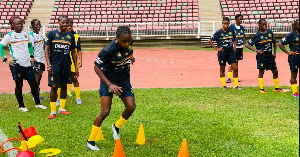Against a background of increasing crime in Cameroon, we of this publication are advocating that only Cameroonians with upright morals should be recruited into the police force to put an end to this vice.
Cameroon Concord's security reporter opined during last week's editorial meeting that the rising crime wave in urban centers like Yaounde, Douala, Bamenda, Limbe, Kumba and Garoua reflected the inefficiency of the police force which has lost respect from the public.
Members of the public no longer collaborate with the police who today in this CPDM confusion, consider themselves as lords and bullies instead of servants and friends to the public.
It is common these days for a family under attacks from armed robbers to telephone the police station and be told by a police man on duty to channel their complaints to BIR-the President Biya newly created the elite force.
Cameroonians have resorted to lynching as a result of apparent loss of confidence in what this generation of CPDM policemen can do.
In Anglophone Cameroon where the rule of law reigned supreme in the days of the Late President Ahmadou Ahidjo and J.N.Foncha, people suspected of committing crimes today in Bamenda, Limbe, Mutengene, Kumba and Buea are killed through mob justice simply because the public feels that it would not achieve justice, equity or fair play if it reported such cases to the Cameroonian police force.
While innocent people are being killed in the process, other suspects are unfairly presumed guilty and lynched without trial by the law courts.
A career policeman and a senior member of the Cameroonian judicial police who spoke to us recently on the policing situation in the country noted that during the Ahidjo regime, he never heard anything about lynching. Policing he added was carried out by the police officers in collaboration with the civilian elements who cooperated with the police force.
He argued that the CPDM have politicized every aspect of the police force from appointments, promotion and down to command operations with Francophone personnel who do not have a mastery of the English language heading major security operations in the South West and North West Regions culminating to many fiasco.
In neighboring countries like Equatorial Guinea and Gabon, the ordinary citizen is vigilant and would provide intelligence to the police the moment anyone was suspected.
This relationship between the police force and the community is possible because the police were kind and collaborative with the ordinary citizen of the towns and cities. Numerous francophone delegates of national security have come and gone but the policing establishment in Cameroon in shambles.
In the Federal Republic of Germany, a country in Europe that Cameroon shares a special relationship, and even in mother France, no matter how intelligent you are or what exam you passed, police recruitment is a matter of moral upbringing.
This explains why the Ahidjo government insisted on moral background checks from all academic institutions attended and even religious denomination before you were accepted into the police force.
Cameroon Concord under cover reporter who visited the police academy in Mutengene found out that it was a normal practice today for young recruits to have scuffles with their bosses and were not fired from the school. There is indeed an urgent need to redefine and expand our Cameroonian policing policy and scope to fit into today's security challenges.
Actualités of Thursday, 18 September 2014
Source: cameroon-concord.com













